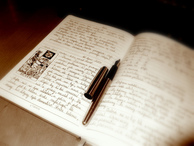
(Originally posted on August 31, 2010) One of the missing art forms these days is writing. Social media, email and texting have destroyed our ability to string together anything but a few phrases or sentence fragments.
But what's also missing is the learning and growing process that writing promotes and actually creates. If you journal, you know this to be the case.
Keeping a journal helps you think through a problem, analyze a thought or idea in depth. Often, new ideas emerge. You see things in a new way.
But what's also missing is the learning and growing process that writing promotes and actually creates. If you journal, you know this to be the case.
Keeping a journal helps you think through a problem, analyze a thought or idea in depth. Often, new ideas emerge. You see things in a new way.
If you don't use a journal, I highly recommend it. Don't think of it as a diary or merely a chronicle of events. Make it about what you think of the events or how they affected you. I have gained new insight simply by spending time writing and reflecting on a quote, article or idea.
Three keys for an effective journal:
For more ideas and tips, have Wes speak to your firm or organization. Click here.
Three keys for an effective journal:
- Purposeful - attempt to understand or synthesize what you are learning. You might read an interesting article and choose to write your own take on the same topic.
- Regular - your skills and ability to analyze issues and ideas grow with practice. You get better over time, so try for once a week or even daily if you can make it a priority.
- Uninterrupted - You need time to be quiet and alone with your thoughts so that you can focus on the subject. I like to use a notebook and pen, but you may prefer to type out your thoughts on a laptop.
For more ideas and tips, have Wes speak to your firm or organization. Click here.


 RSS Feed
RSS Feed
